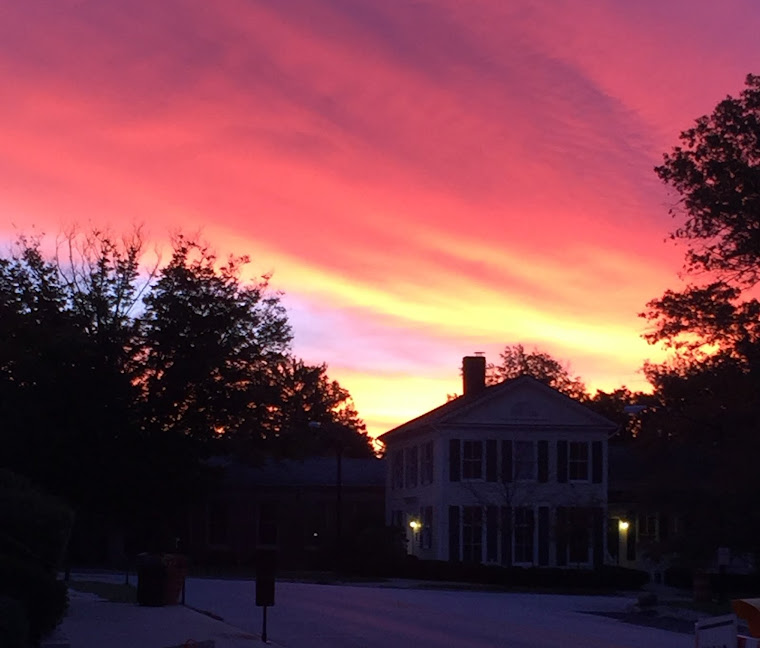Yesterday, I posted on my blog "Daily Doggerel" (link) a few pictures I'd taken on July 21, 2005, in and around Red Cloud, Nebraska. One of them shows Joyce and me standing near the girlhood home of writer Willa Cather (see above), whom I was chasing around various places that summer because our "summer reading" (for juniors at Western Reserve Academy) that year was Cather's Nebraska novel My Ántonia, 1918. I hadn't read a lot of Cather, so I was spending the summer reading her complete works--and visiting sites that had been important to her.
Before the Nebraska trip with Joyce, I'd already driven (alone) to Pittsburgh, Pennsylvania, to see where she had lived when she was teaching in a high school (that building still stands, too--and, yes, I saw it). I'd also gone to Back Creek, West Virginia (near Winchester), the area where she'd been born; both her family's home and her grandparents' home (not far away) are still standing.
After Red Cloud, Joyce and I drove out to Ketchum, Idaho, to see some Hemingway sites: the home where he killed himself, the restaurant where he ate his final meal, etc.
But this is not a summary of our literary visits. No, that picture perched atop this post--a picture I'd not really looked at very closely in quite a while--gave me pause this time. And here's why ...
On June 5, 2005, just about six weeks earlier, I had undergone prostate cancer surgery at the Cleveland Clinic: a prostatectomy (the removal of the gland). The surgeon's hope--hell, my hope--was that the procedure would cure me.
It didn't.
In subsequent years (as I've posted here now and then) I've undergone two rounds of radiation, a course of immunotherapy, and I'm now on some pretty powerful meds that have permanently altered my life. Trelstar, for example (a quarterly injection), killed my libido (it suppresses testosterone, the food of prostate cancer), sapped my energy, gifted me periodic "hot flashes," made me vulnerable to bouts of depression, etc.
Anyway, I was determined, in 2005, that I would not let my recent cancer surgery prevent me from living the way I wanted to. Although during the time of the Red Cloud trip I was wearing, well, liners to prevent post-surgical dripping, although I was still feeling a little bite where the surgeon's knife had bitten me, although I was dealing with my evanescing sex life, I was still ... hopeful.
And so we drove around Nebraska, around Idaho--and in subsequent years we made many other "literary" trips all over the place, spent an early-August week in Stratford, Ontario, for the Stratford Theatre Festival (about fifteen consecutive years we did that). But Time and Age and Illness began to win the wrestling match that I, deluded, had thought I was winning.
So ... I look at that picture now ... I see on my face, in my posture, a determination to appear "normal." Still in control.
I would go back to WRA that fall, would teach Cather's novel and Hamlet and The Great Gatsby and other works I loved. And for a few years I thought I'd actually won the battle.
Until my PSA (Prostate Specific Antigen) began rising again. By late 2009 it was high enough that my oncologists recommended a course of radiation ... and so began my journey down the road I am still traveling. I'm stumbling more now (literally and metaphorically)--finding it more difficult to deal with the increasing darkness--but as that photo shows, I still can hold close that human being who keeps me sane (most of the time), who keeps me (moderately) hopeful, who has shown me for nearly a half-century the vast dimensions of Love.
***
Thought I'd show you the whole house--and the historical marker outside.
































